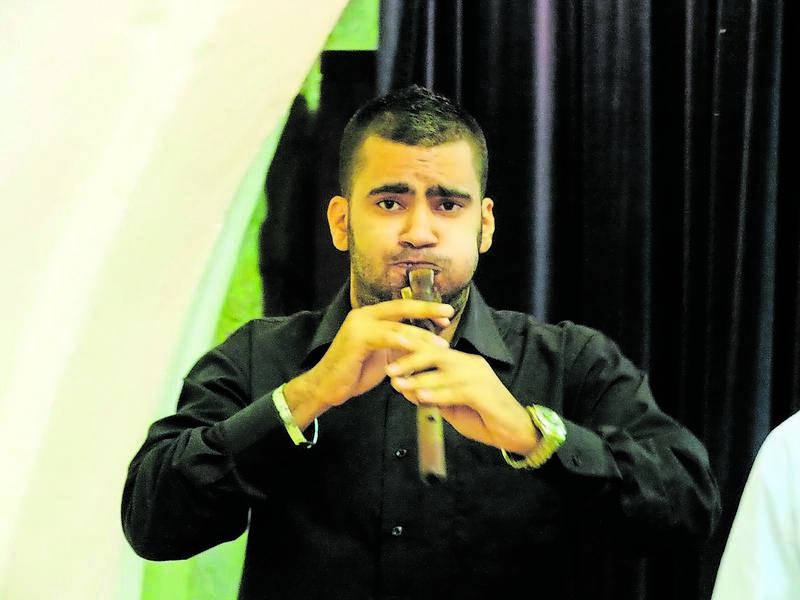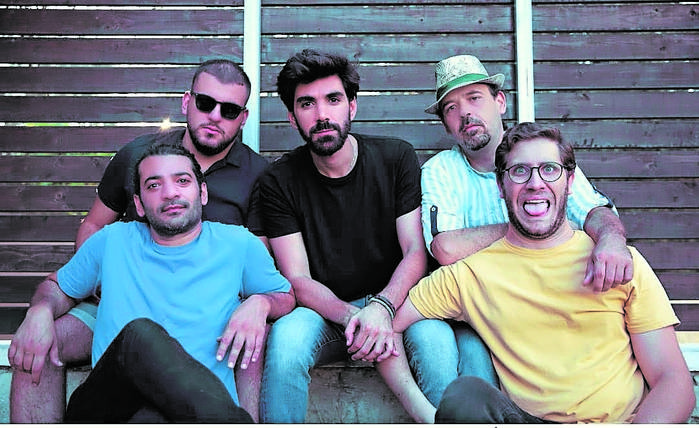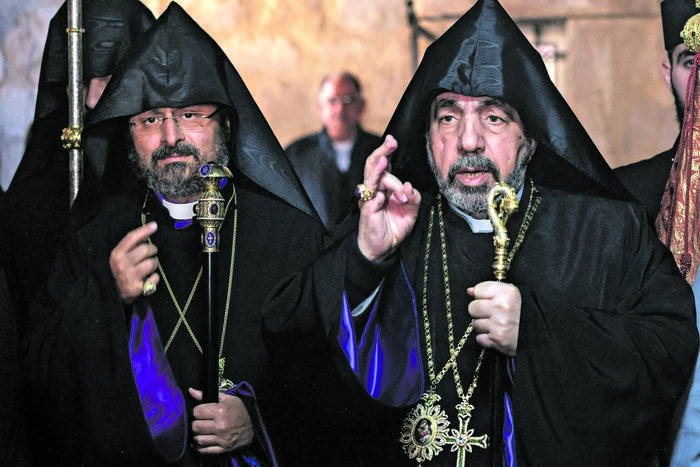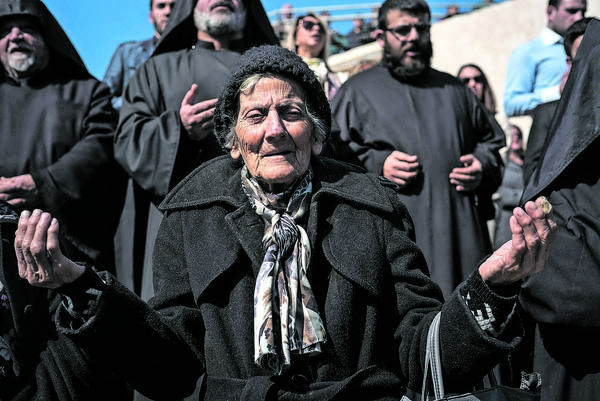Palestinian Armenians fight to keep their music alive
As Israel’s genocide of Palestinians in the Gaza Strip continues into its seventh month, the Armenian community in Palestine and worldwide last week, on 24 April, commemorated the nearly 1.5 million Armenians killed in the 1915 genocide under the Ottoman Empire.
Many of those who escaped that genocide fled to Palestine, and specifically to Jerusalem, where they joined one of the oldest established Christian and Armenian communities, referred to as the kaghakatsi.
More than a century later, Jerusalem’s Armenian community still faces a daily struggle for safety. Earlier this month, the Lemkin Institute for Genocide Prevention issued a red flag alert for the Armenian Quarter, where extremist Israeli mobs have been attacking the community in an effort to confiscate the piece of land known as Goverou Bardez (the Cows’ Garden).
A sanctuary for Armenian pilgrims and refugees, the Cows’ Garden is strategically located at the south-western corner of the Armenian Quarter on the historic Mount Zion, adjacent to the Christian Quarter. The land has been owned by the Armenian Patriarchate for nearly 700 years.
In October 2021, however, it transpired that the Patriarchate had illicitly signed a lease agreement with private company Xana Capital, owned by Israeli-Australian businessman Danny Rothman (Rubinstein), giving away about 60% of the area and thus endangering the community’s cultural and social heritage. The Patriarchate later sought to void this agreement, leaving the land in a state of legal flux.
Fears mounted when the community discovered that Rothman had ties to Israeli extremists.
Yet the recent attacks on the Armenian Quarter were not a mere result of the discovery of the controversial deal. The community faced attacks throughout last year, as tension mounted across historic Palestine ahead of 7 October (when Hamas attacked Israel) — and long before that, there seems to have been a conscious attempt to slowly empty Jerusalem of its historic diversity and beautiful heterogeneity.
To find out more about this phenomenon, we don’t need to investigate the manifestations of violence per se. As French philosopher Jacques Attali tells us, “What is called music today is all too often only a disguise for the monologue of power.”
Hence, I set out to interview a varied group of musicians from the Palestinian Armenian community, listening to their stories and music and trying to piece together the threads of different generations of Armenian musicians who have made Jerusalem their home over the past seven decades.

The birth of Palestinian rock
The faded recording that’s piping out of my phone and into my headphones sounds like a rock band playing in a large hall with the echo of a fully packed audience, the reverberations regularly punctured by the ecstatic screams of women and occasional whistles.
“Can you hear that?” exclaims Serop Ohannessian on the other end of the line. “That was our first concert!”
The recording took us back to Jerusalem in 1966, when the first Palestinian rock band, The Flintstones, played to a hungry audience of music lovers in the hall of Schmidt’s Girls College.
Ohannessian reminisces about the early days of rock, in the mid-1960s: “There was this big change in music, and we were all influenced by listening to the radio. There were hardly any TVs around back then. There was no Israeli TV and our cultural references came through magazines and mainly radio.
“The Beatles made a big impression all around the world, and teenagers were reacting in their unique way across England and America,” he continues. “It came as a natural response that Palestinians attending a concert at the time were jumping up and down, whistling, screaming and moving to the music.”
Not exactly a native genre to Palestine, rock music trickled slowly into the music scene in the 1960s, following the lead of a global craze driven by the distorted and amplified sounds of electric guitars. In Palestine, this story is intertwined with the story of the Armenian community, mostly centred in Jerusalem.

“A lot of Armenians came to Jerusalem after the [1915 to 1923] genocide, including my parents,” says Ohannessian. “They had a strong connection with their history and they had clubs in Deir El-Arman — the Armenian Quarter — and the cultural clubs played an enormous role in preserving Armenian poetry, drama and music. It was a big part of expressing our pain, our agony and our happiness.”
It was there, somewhere between the nadi (“club” in Arabic) and the performance spaces, that a new musical identity transcended the confines of separate religious spaces and travelled down the streets and into the performance halls of Palestine and beyond.
The Armenian community first arrived in Palestine in the third century CE and settled in Jerusalem as monks. This community was replenished by a new wave of arrivals from 1915 onwards, as thousands of Armenian families arrived in Jerusalem, Bethlehem and Haifa, fleeing the Ottoman massacres of Armenians and other religious minorities in the region.
This fraught history is captured in the community’s music. Joseph Zaarour, a Palestinian duduk (a double-reed wind instrument used predominantly in Armenian music) player and a tour guide of Armenian heritage, tells me of his great-grandmother, who was part of the kaghakatsi community — the natives who have lived in Palestine for centuries.
“The music of the Armenians is sad,” Zaarour explains. “I would spend time in the Armenian Quarter and hear the music coming out of the nadi or from the convent and I would ask my father [a musician] about the sound of the [duduk] spilling out and filling the surrounding streets.”
Those encounters with the community’s music were the pivotal inspiration that sparked Zaarour’s interest in music, as it did for many a Jerusalemite musician like him.

An infectious force
Within the confines of the Armenian Quarter, two main nadis raised generations of artists and cultural enthusiasts, serving as a space to bring the Armenian community together.
One of them, the Homenetmen, is loosely associated with the political party that persistently resisted the Turkish massacres of the Armenians. There, the new arrivals would “often sing patriotic songs which kept the spirits of the refugees who fled the massacres”, Ohannessian says.
In Jerusalem, the Armenian convent provided those fleeing the genocide with a safe space and a shelter until they found a way to settle in.
“The songs played there evoked emotions of survival and urged us to never give up and to preserve our language and religion,” he explains.
The other club, known as the Hoyechmen, was more of a creative space and was filled largely with Armenians who came from the Soviet Union. It produced poets, playwrights and other cultural personalities within the community.
While the majority of Armenians sent their children to the Armenian school, some chose to send their children to local missionary schools, a choice that would affect the formation of The Flintstones.
“Me and Hagop [Kaplanian] went to the Collège des Frères, where every morning between 7.30 and 8 we would sing in the mass. And we couldn’t wait to go there to sing,” recalls Ohannessian with a touch of nostalgia.
The musicians who went to the missionary schools seem to have developed a more adventurous palate, according to Ohannessian.
“Armenians who stayed in the Armenian Quarter would be immersed in Armenian culture,” he says. “Arabic and English were different cultures from ours, but for [those of] us who went to schools like Collège des Frères, where Armenians were a minority, we became involved in them.”
Those cultural influences included being exposed to British and American media and music. And so it was that, after seeing the famous movie Rock Around the Clock, featuring Bill Haley & His Comets, along with Alan Freed, The Platters, Tony Martinez and His Band, and Freddie Bell and the Bellboys, Ohannessian and his friends were inspired to form their own band.
“I went to Hagop and Peter [Sarkissian, one of the founding members of The Flintstones alongside his brother Mardo] and told them that I’d teach them to play and we’ll form a band and the girls will be screaming!” Ohannessian says.
“We went to the principal of the school and told him we wanted to form a band.”
The Flintstones was born.
At the time, there were no shops for musical instruments in Palestine, so the group decided to order electric guitars from England through a music magazine.
The instruments raised the suspicion of the customs officers at Jordan’s Aqaba port, where they had arrived by ship, and the band members had to send a respectable emissary to negotiate the release of their musical hostage.
“We convinced one of the monks at the school to intervene in order to clear the customs and bring the guitars to us,” Ohannessian recounts.
“The guys at the customs didn’t know what to do and, at that time, Jerusalem was under Jordanian rule. We convinced the monk to go to Amman to explain what guitars are and that they were used for educational purposes.”
Learning to play the instruments and finding spaces to perform was another story.
“It helped us to attend other musical performances, which were taking place at venues like the Grand Hotel in Ramallah over the weekends or the Orient House in Jerusalem,” Kaplanian, one of the founding members of The Flintstones, explains. “These venues had visiting musicians from Italy, Spain or France. By mingling with them, some of The Flintstones learned a few tricks on the drums or other instruments.”
Living in Jerusalem, Kaplanian points out, also meant being exposed to a diverse array of cultures, especially through radio, due to the varied broadcasts set up by the British and, later, Jordanian governments.
The Flintstones proved an infectious force in the mid-1960s, inspiring the formation of a host of other bands, among them The Yarnies, The Mosquitos and the all-influential Al-Baraem. The band toured widely, playing mostly rock covers but also performing original songs.
“We went to different concerts in Amman, we performed in the US Cultural Centre, Cinema Rivoli in Amman, Cinema Al-Hamra in Jerusalem, Schmidt’s Girls School, the Chamber of Commerce, in the Frère College hall, Birzeit University and many different places,” Ohannessian recalls.
The Flintstones’ surviving recordings are on reel-to-reel and need significant audio work to restore them to better sound quality.
They did make one professional recording, however. When the famous Armenian radio presenter Robert Beneyan, who used to present a number of programmes on Radio Jerusalem, came to visit the band in 1966, they recorded three songs at Ohannessian’s parents’ apartment.
The radio station was just beside the Ritz Hotel in Jerusalem. Sadly, its archive was lost and the whereabouts of its recordings remain a job for another research project.

Fighting for survival
Yet this golden era of rock music across the 1960s and 1970s did not last long. The occupation of Jerusalem in 1967 caused a massive rift in the native community, as Armenians began leaving the city in waves.
“There were 10 000 Armenians in Jerusalem [before the occupation] and now there’s only 200 families in the convent, and everyone is leaving,” Zaarour laments.
While one of Palestine’s most pioneering bands, Sabreen, was formed in the 1980s, along with the music scene’s expansion into further genres, the influence of Armenian musicians within the city decreased as the Armenian and Christian communities left Jerusalem. To this day, they continue to be subjected to forced displacement.
Nonetheless, members of the community are still playing music at church and in the convent and, to some extent, in the nadi.
As musician, singer and songwriter Apo Sahagian attests: “The church and the Patriarchate are always going to stay in Jerusalem, but the [non-clergy] will come and go.”
Sahagian is known for his Bethlehem-based rock band Apo and the Apostles. Although they mostly sing in Arabic, Sahagian notes that one “can hear influences of Armenian, Balkan and Greek music” in their songs.
The grandson of an Armenian refugee who escaped the genocide and arrived in Jerusalem after 1915, Sahagian has been working on solo projects reinterpreting Armenian folk music and preserving dialects.
He released his album Menk in 2022, where the inherited influences of his surrounding Armenian culture can be heard through its instrumentation and language.
Sahagian’s frequent stays in Armenia also mean he maintains direct contact with “the motherland” and the cultural changes there.
Despite Sahagian’s success, as well as that of a small number of other musicians still working in Jerusalem, a large portion of the Armenian community feels under direct threat. Last year, there were numerous attacks on the Armenian Quarter by extremist Israeli Jews, sparking considerable debate within the Armenian community about its safety and how Armenians are perceived within the wider society.
“The community realised how weak we are within the system,” Sahagian says. “It was a demonstration that, if you’re not Jewish, you’re not part of the system.
“The Israeli soldiers waved their guns at the Armenians [during the attacks in January last year]; in the eyes of the soldiers they only see us as outsiders.”
One year on, the violence has escalated, as Israeli settlers accompanied by police continue their attempts at seizing the historic Cows’ Garden.
If you walk through the streets of the Old City nowadays, and listen closely, rarely does the sound of an instrument seep through the crack of an open window. But the legendary nadi still stands, diffusing Armenian cultural riches to those who remain — albeit mostly through liturgical or patriotic songs.
It is estimated the number of Armenians in Palestine has dropped from 27 000 in the first half of the 20th century to fewer than 5 000 today. The absence of the more secular and transgressive music is perhaps a marker of the absence of those who used to play it.
There are, nonetheless, voices springing up and individual attempts breaking through the mechanised noises of arms, machinery and vehicles jamming the streets of the Old City — voices such as that of Jerusalemite guitarist, rapper and composer Ivan Azazian.
Formerly active with the Ramallah-Jerusalem band El Container, Azazian has been forging his solo career through a diverse range of compositions — as can be heard in his latest release, titled Textures.
“There are barely enough musicians in the Armenian-Jerusalem community. You can count them on your fingers, and the reality is sad, especially with what is happening now,” Azazian says from his new home in Brussels, Belgium.
“I personally don’t feel I can represent the Armenian community, as I have been abroad for many years. Now I only keep up through friends.”
But the tradition, he says, is still alive. “Through the nadi, some people are still trying to preserve the traditions and music, in addition to traditional Armenian dance. It has not died out. Through the scouts [Christian groups that march through cities on holidays], current generations train the next generations.”
And alive may it remain, in spite of the challenges and hardships that the Palestinian, Armenian and other indigenous and marginalised communities across historic Palestine are undergoing.
This article is republished with permission from +972, an independent, online, non-profit magazine run by Palestinian and Israeli journalists.